| Srl | Item |
| 1 |
ID:
177618
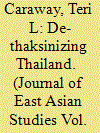

|
|
|
|
|
| Summary/Abstract |
Almost two decades after the initial victory of Thai Rak Thai, scholars still debate the forces behind Thaksin's rise to power. I revisit these debates and argue for a more explicit analysis of dynamics over time. I distinguish analytically between the founding moment of TRT's first victory and the subsequent reproduction of its dominance. I argue that TRT's financial muscle was a sufficient condition for its 2001 victory, that institutions merely contributed to the scale of its victory, and that its platform was not decisive. Once in power, however, institutions were instrumental in allowing TRT to complete its term, but more important for its long-term dominance was the rapid implementation of its campaign promises, which created a mass constituency that in turn made Thaksin-linked parties resilient at the polls despite institutional reforms designed to weaken their electoral performance.
|
|
|
|
|
|
|
|
|
|
|
|
|
|
|
|
| 2 |
ID:
096290
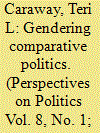

|
|
|
|
|
| Publication |
2010.
|
| Summary/Abstract |
This essay offers a conceptualization of a comparative politics of gender (CPG) and some explanations for why CPG work is marginalized in the comparative politics subfield. I delineate CPG as a field of study in which gendered dependent or independent variables are the defining feature and present illustrative examples of four different types of CPG research. I contend that institutional and historical factors account for much of the marginalization of CPG research, and I propose some courses of actions through which CPG scholars can lessen this marginalization. The failure of comparative politics scholars to engage with gendered work is also a serious problem. The essay concludes by offering some suggestions for better integrating CPG scholarship into the subfield.
|
|
|
|
|
|
|
|
|
|
|
|
|
|
|
|
| 3 |
ID:
112131
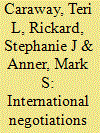

|
|
|
|
|
| Publication |
2012.
|
| Summary/Abstract |
What is the role of international organizations (IOs) in the formulation of domestic policy, and how much influence do citizens have in countries' negotiations with IOs? We examine these questions through a study of labor-related conditionality in International Monetary Fund (IMF) loans. Using new data from IMF loan documents for programs from 1980 to 2000, we test to see if citizens' economic interests influence IMF conditionality. We examine the substance of loan conditions and identify those that require liberalization in the country's domestic labor market or that have direct effects on employment, wages, and social benefits. We find evidence that democratic countries with stronger domestic labor receive less intrusive labor-related conditions in their IMF loan programs. We argue that governments concerned about workers' opposition to labor-related loan conditions negotiate with the IMF to minimize labor conditionality. We find that the IMF is responsive to domestic politics and citizens' interests.
|
|
|
|
|
|
|
|
|
|
|
|
|
|
|
|
| 4 |
ID:
088880
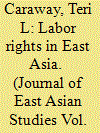

|
|
|
|
|
| Publication |
2009.
|
| Summary/Abstract |
This article examines the impact of recent economic and political change on collective and individual labor rights in East Asia. Deploying a new index for measuring de jure and de facto labor rights, the article presents new comparative data on labor rights in the region. Democratization has produced stronger collective labor rights in much of the region, but labor laws in most countries still fall far short of international labor standards. East Asia's labor laws offer similar levels of protection for individual labor rights to the rest of the world when firing costs are taken into account, and low regional averages are primarily an effect of Singapore's extremely weak individual labor rights. Few countries have revised their labor laws in the direction of greater labor market flexibility. However, the distance between law and practice is wide, so improvements in laws are not necessarily reflected on the ground. Flexibility enters through the back door of ineffective labor law enforcement, which in turn has affected the organizing efforts of unions.
|
|
|
|
|
|
|
|
|
|
|
|
|
|
|
|
| 5 |
ID:
111845
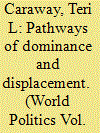

|
|
|
|
|
| Publication |
2012.
|
| Summary/Abstract |
Legacy unions-formerly state-backed unions that survived democratic transitions-are one of the most persistent legacies of authoritarian rule. While usually successful in maintaining their preeminent position, legacy unions have in some cases been overtaken by competing unions. Deploying a set of paired comparisons of legacy unions that entered the transition with similar legacies but experienced different fates-Indonesia with South Korea and Poland with Russia-this article examines why some legacy unions continued to dominate (Indonesia and Russia) and others did not (South Korea and Poland). The author identifies four pathways of change: endurance (Indonesia), attrition (South Korea), hegemony (Russia), and rupture (Poland). Several features of the transition context propelled legacy unions down distinct pathways of change-the widespread mobilization of workers outside of state-sponsored unions early in the transition, partisan links, and the structure of union competition.
|
|
|
|
|
|
|
|
|
|
|
|
|
|
|
|